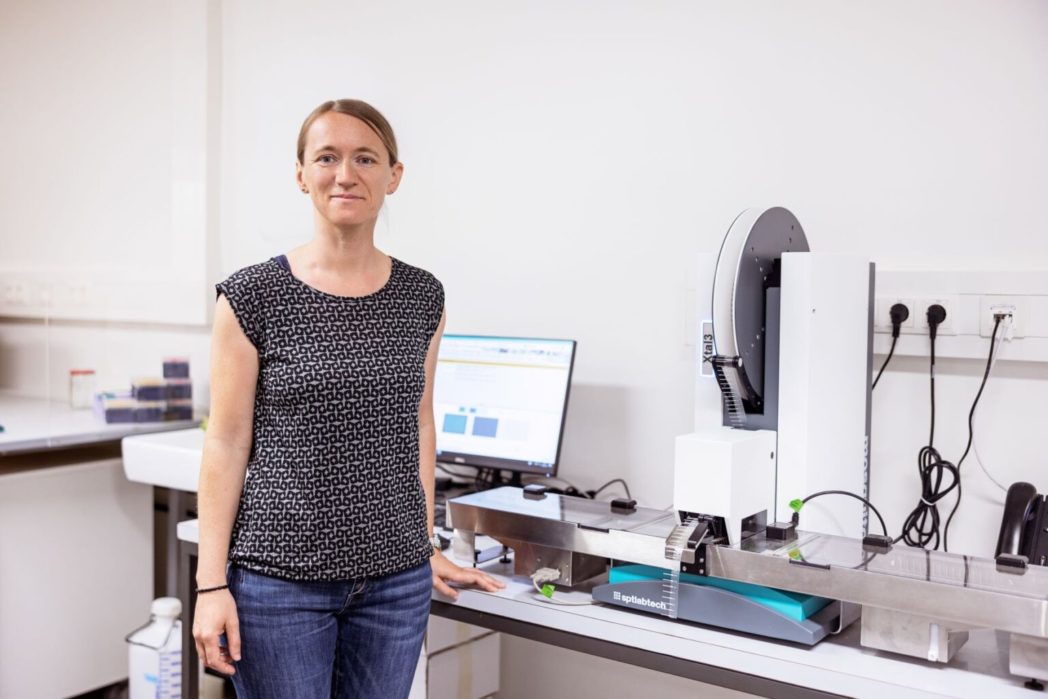
If legumain is detected outside its usual location in the human cell, those affected are very likely to suffer from cancer or Alzheimer’s disease. Dall now wants to elucidate the underlying mechanisms in detail, especially with a view to developing active substances in the future.
Although the protein legumain is one of the busy workhorses in our cells, it is still largely unexplored. It is known that it cuts foreign antigens, such as pathogens, into small pieces so that they can be recognised and disposed of by the immune system. The protein performs this task in the so-called lysosome, where it is more or less “at home”. However, if it occurs in other places, it “causes damage like a bull in a china shop, leading to Alzheimer’s or various forms of cancer”, explains Elfriede Dall.
But why does the protein sometimes appear where it doesn’t really belong, namely outside the lysosome? That is unclear. “But what we have already discovered in Salzburg in the working group of structural biologist Hans Brandstetter is a second function of legumain: It can not only cleave foreign antigens but, on the contrary, also glue them together, but only when it occurs outside the lysosome. Our hypothesis is that the gluing function is one of the key mechanisms in the development of the disease,” says Dall.
Until now, however, there has been no way to observe these connections at the site of action in the cell, says Dall and adds: “In the START project, we now want to develop the appropriate methods for this. Only when we fully understand the connections can we develop targeted substances that can be used for Alzheimer’s or cancer therapy. Experiments in the animal model prove that we are on the right track. It could be shown that blocking legumain can stop the growth of tumours and have a positive effect on neurological abilities in Alzheimer’s disease.”
The award winner
Elfriede Dall completed her PhD in molecular biology at the University of Salzburg in 2013. Since 2014, she has been a Senior Scientist in Hans Brandstetter’s Structural Biology Group at the Department of Biosciences and Medical Biology at the University of Salzburg. Dall’s previous FWF project, which has been running since 2018, was already dedicated to researching legumain.
About the project
The START project “Functional Studies on Extra-lysosomal Legumain” investigates the functions of the protein legumain outside the endolysosome of the human cell. Normally, the effect of the enzyme, which breaks down foreign antigens, is limited to this cell organelle. Outside, however, other mechanisms become effective that are associated with the occurrence of cancer and Alzheimer’s disease. These functions are to be researched in detail in order to lay the basis for active substances in this field.
The START Programme
The START-Prize is Austria’s most highly endowed science prize for young researchers. The prize, which is awarded once a year by the Austrian Science Fund (FWF) and presented by the Minister of Education, is endowed with up to 1.2 million euros.
The prize winners are selected by an international jury of experts, whose members come from Harvard University, for example.
That might be interesting for you
11. November 2025
Eleven Million Euros for Five New Research Centers
Salzburg is investing in research: around eleven million euros from EU and state funds will go toward establishing five new research and transfer centers. They cover key future-oriented topics: artificial intelligence, climate protection, health, tourism, and data security.
6. March 2025
salz21: Necessary Steps for the Future
On March 5, 2025, salz21 | Home of Innovation once again provided a platform for future topics, innovations, and interdisciplinary exchange. More than 1,000 visitors took the opportunity to learn about current developments and discuss perspectives for tomorrow. Three topics were particularly dominant: climate protection, artificial intelligence, and a strong Europe.
20. September 2024
15 Million Euros for Salzburg’s Life Sciences Future
The federal government and the Province of Salzburg are jointly investing in research, education and medical innovation. The new Life Sciences Masterplan strengthens cooperation between University of Salzburg, Paracelsus Medical University and Salzburg University Hospital, focusing on cancer research, neuroscience and regenerative medicine.
6. September 2024
Franz-Benjamin Mocnik researches the communication of places.
In Salzburg, there is an exciting digitization research project: Franz-Benjamin Mocnik is studying the communication of places for the Faculty of DAS.